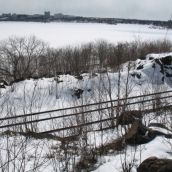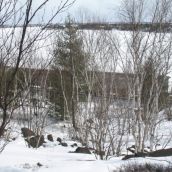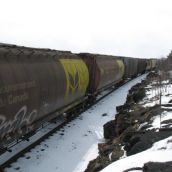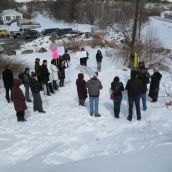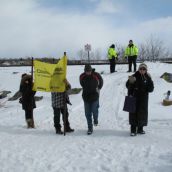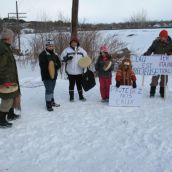Despite the wintery weather and short notice, approximately twenty-five people came out in support of protecting our water this Sunday, March 22. The Sudbury Chapter of the Council of Canadians hosted the rally to mark World Water Day. The location was the end of Somerset Street, where the rail line skirts Ramsey Lake along its northern shore. Four CP rail police observed the rally and kept people away from the tracks, and a Greater Sudbury police cruiser was nearby.
The location highlighted heightened concerns over the possibility of a rail accident and disastrous spill into Ramsey Lake. Three recent derailments in Northern Ontario have brought the fears of such a disaster close to home. People were especially shaken by the March 7 derailment, fire and crude oil spill near Gogama. André Clement, Council of Canadians, talked about their site visit to Gogama. “We couldn’t make it close to the site but we talked to the people there. It could have been another Lac Megantic,” he said.
“We don’t know what hazardous materials are being hauled through Sudbury. The government tells us we’re being ‘protected from terrorists’ by not telling us,” declared Elaine Porter of the Council of Canadians, making a strong link to the need for transparency and access to information in order to meet our rights and responsibilities as citizens. “It is instructive to look at Transportation Canada’s website,” she continued, calling the information there “chilling.” She discovered that ageing infrastructure, infrequent monitoring and human error were all raising the risks of accidents. These point to some immediate steps that can be taken until safer tankers are phased in in 2017, until the rail line can be moved out of the city and away from the lake, and until we reduce our dependence on fossil fuels.
Many people spoke about the need to move the rail line away from the shoreline. “We’re worried about this lake,” said David Robinson (economist and Green Party candidate). “It is really important here. We drink it, it is part of our identity and our quality of life,” he continued, calling the rail line “a real threat to it”. “This railway track is not necessary anymore,” declared Robinson, outlining what he feels is a strong economic case to remove them. According to Robinson, there would be many economic benefits to the City, and the railway would also save “millions of dollars from not having to slow down.” He expressed his hope that the new Council will look favourably on the idea. “Make a presentation to Council, get a feeling of where they’re at,” urged Wyman MacKinnon.
Lilly Noble, Ramsey Lake Stewardship Committee, emphasized that pipelines are not the answer, referring to a history of pipeline spills impacting waterways, most notoriously in Kalamazoo. Changes to the navigable water act under the Harper government mean that Environmental Assessments are not required before pipelines cross the large majority of waterways. Noble explained that the proposed Energy East pipeline would carry dilbit through a 40 year old pipeline designed for and currently carrying natural gas, at a higher pressure, a higher temperature, and a higher sulfur content, which can lead to explosions. This pipeline would pass through many northern Ontario communities, including through the source water protection zone for North Bay’s drinking water.
Concerns for Ramsey Lake went beyond the threat from the rail line, and many speakers referenced the impacts from development, and the need for a watershed study to assess existing and future impacts. “We are still waiting for that,” said Noble, “Council just devoted a little more money for that in the budget.” Chris Nash exhorted everyone to take personal responsibility for water quality. “Every one of us lives on watershed that drains into one of our lakes,” she said, urging people to ‘look out their windows’ and take action, for example by preventing road sand and salt from draining into storm drains and directly into lakes. John Lindsay pointed to the responsibility of City Council. “We drink, swim and fish in this lake. We have a responsibility to protect this lake,” he said. He was among a handful of people who expressed their disappointment that councillors were not present. Invitations had been extended to some councillors by the Council of Canadians, but they had indicated they were busy with other commitments. Clement urged people to take responsibility in another way. “Talk to Council members, to friends, to family,” he urged. He called on those there to help create awareness, to vote for protection of water and environment in the 2015 election, and to talk to candidates in the upcoming federal election.
Thoughts also turned to those experiencing water hardships elsewhere. “I want you to remember two numbers: 1838 and 47,” said Clement, explaining that 1838 was the number of water advisories in Canada in January 2015, the majority in First Nation communities, and 47 the number of fatalities in the Lac Megantic disaster. Clement also referenced water quality concerns from clear cutting at Geneva Lake and Grassy Narrows. Richard Eberhardt (Northern Ontario Organizer for the New Democratic Party of Canada) called for solidarity with people around the world suffering water shortages and lack of access to fresh, clean water.
The statements of a young Anishinabekwe, Samantha McComber, received the most response, and brought the conversation back home. “Water is pretty much everything. No living thing can exist without it. If we can’t help ourselves, we can’t help anyone else, so we need to protect Ramsey Lake,” she stated, before leading drumming and singing of the water song at the end of the rally.
